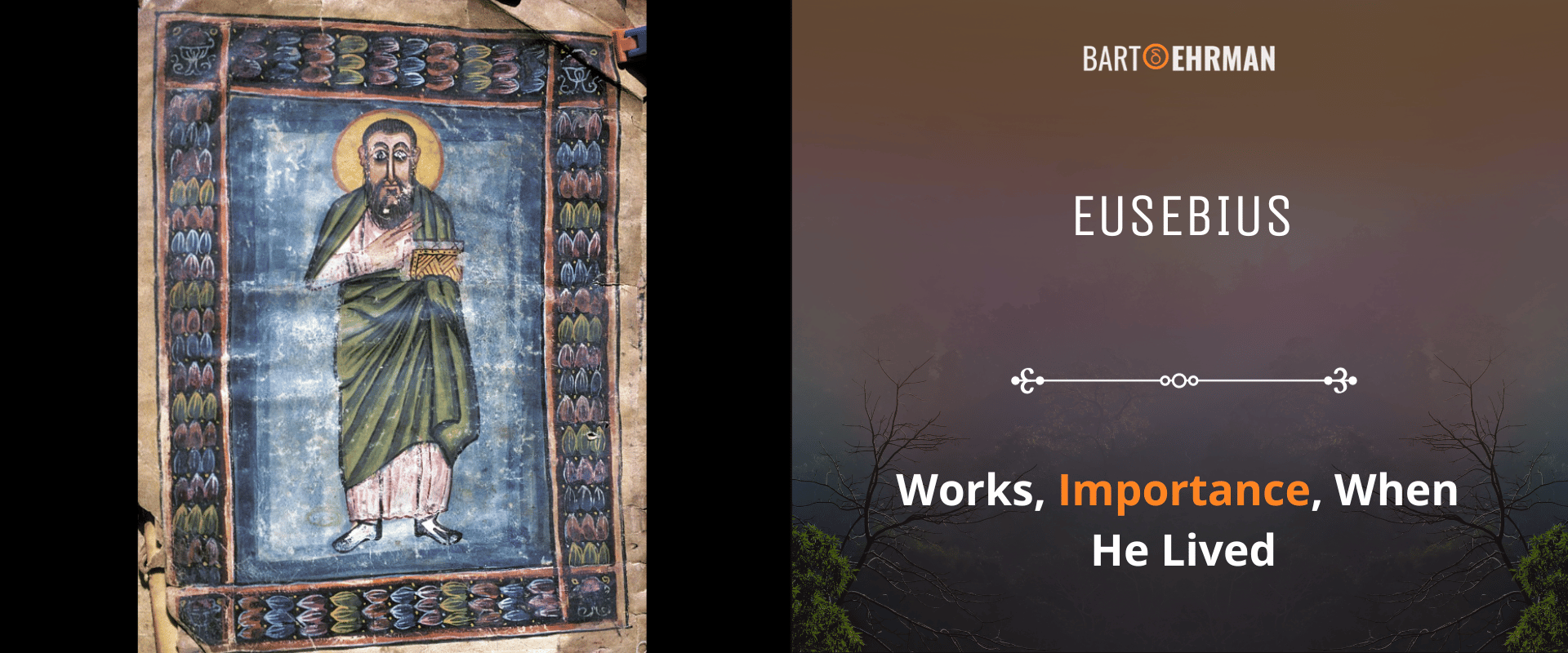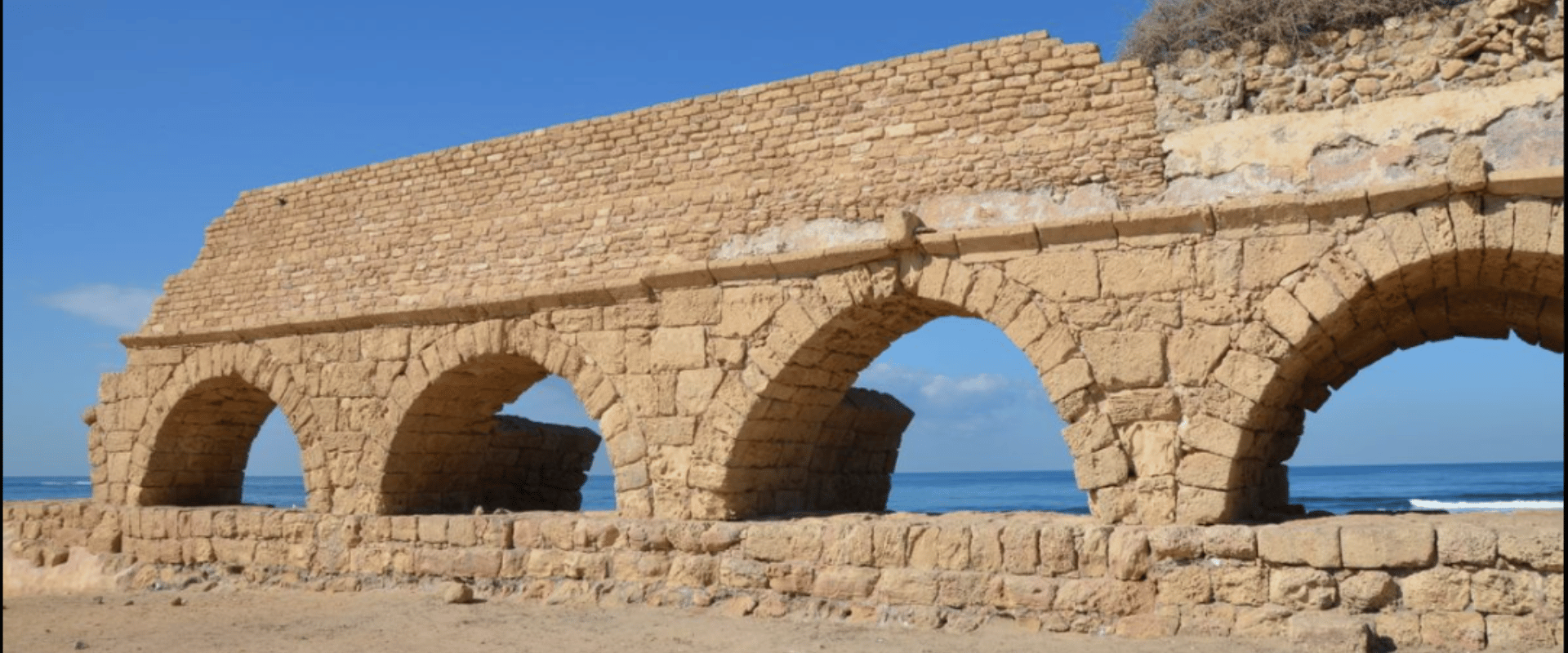Eusebius: Works, Importance, When He Lived

Written by Marko Marina, Ph.D.
Author | Historian
Author | Historian | BE Contributor
Verified! See our guidelines
Verified! See our editorial guidelines
Date written: December 7th, 2023
Disclaimer: The views and opinions expressed in this article belong to the author and do not necessarily match my own. - Dr. Bart D. Ehrman
Step into the annals of early Christian history, and you will find the name Eusebius of Caesarea etched in its foundational stones. A scholar, a chronicler, and a pivotal figure in the religious and cultural metamorphosis of the Roman Empire, Eusebius stands as a witness and an active participant in the transformative years of the Christian religion.
Eusebius’ work offers a window into a world teetering on the edge of monumental change, providing insights into the birth and evolution of a religion that would eventually shape Western civilization.
Embarking on a quest to understand why Eusebius is important, we are transported back to when history was in the throes of transformation. Born in a period of seismic shifts in religious and political landscapes, Eusebius's existence was intertwined with the rise of Christianity from a fringe movement to an imperial-sponsored religion.
Who was Eusebius? As we embark on a journey back to the tumultuous times of the third and fourth centuries, we uncover the importance of one man for the whole history of Christianity. Let’s take a closer look to find out more about this fascinating figure!
Before we delve deeper into the captivating world of Eusebius, here's an opportunity to further expand your understanding of the origins of Christianity. Join renowned scholar Dr. Bart D. Ehrman in his enlightening course, "Paul and Jesus: The Great Divide." In this series of eight 30-minute lectures, Dr. Ehrman expertly unravels the complex relationship between two of Christianity's most pivotal figures.

Who Was Eusebius: A Short Biography of a Great Life
To understand why Eusebius is important for the history of Christian religion, we need to look closely at his life. When was Eusebius born? He was born around 260. C.E. most likely in Palestine. The exact location of his birth, however, isn’t definitively known.
Eusebius's formative years (260.-303. C.E.) unfolded during an era when Roman emperors transitioned from mere tolerance to active recognition of Christianity. The period after Emperor Valerian (c. 260. C.E.) saw the Christian Church emerging as an entity endowed with rights.
By the time Eusebius reached his 40s, however, this landscape dramatically shifted, giving way to intense persecution against the Church.
In the year 303 C.E., Emperor Diocletian set forth a formidable edict, igniting what would be recorded as the most widespread persecution (303.-311. C.E.) of Christians in Roman history. This decree unleashed an era of unparalleled trials, particularly in the eastern reaches of the Empire, where Eusebius resided.
His early life wasn’t, therefore, “forged in the fire” of persecution but in the period marked by the toleration and even protection from the Roman government. Only after the persecution began, Eusebius had to turn to apologetic work trying to defend the religion he belonged to.
Despite the challenging and shifting circumstances, Eusebius received a comprehensive education that was deeply rooted in Christian Scripture, Greek philosophy, and literature. He was profoundly influenced by Pamphilus of Caesarea - a scholar and early Christian martyr.
From him, Eusebius inherited a respect for the works of Origen. Timothy D. Barnes notes: “Pamphilus and Eusebius regarded themselves as the intellectual heirs of Origen and devoted their lives to scholarship in the tradition which he had founded.”
Eusebius as a Bishop: The Creation of the Legacy
In the later years of “Diocletian’s persecutions,” the most vigorous enemy of the Christian faith was his co-emperor and successor Galerius. However, despite the great effort he put in, the persecutions didn’t produce the results Galerius had hoped for.
In April 311, lying on his deathbed Galerius decided, as his last political act, to rescind the persecuting edicts and acknowledge Christianity as a legal religion within the Roman Empire. He issued an edict declaring the Church’s right to exist which proved to be the crucial turning point in the history of early Christianity.
The following year, his successor Constantine converted to Christianity. His conversion marked a definitive turn in the history of Christianity as Constantine proved to be an openly pro-Christian emperor who supported the Church and its clergy. However, the new Christian emperor didn’t, as Bart Ehrman shows in his study the Triumph of Christianity, persecute pagan religions at all!
Eusebius became the bishop of Caesarea Maritima (Palestine) around 314. C.E. In other words, he took the bishop’s chair during the transformative period when the Church rose from the persecuted party to a privileged minority with the most powerful figure in the empire on its side.
As a bishop, Eusebius wasn’t only a spiritual leader but also a skilled diplomat and counselor. His close relationship with Constantine allowed him to play a significant role in the political and religious affairs of the Empire.
His role as a bishop was especially significant because of the special position Eusebius held. As both an advisor and a biographer of Constantine, Eusebius’ proximity to the emperor provided him with insight into Constantine’s policies and thoughts.
Furthermore, because of his unique position, Eusebius was able to exercise considerable influence over Constantine. The emperor significantly favored the Christian Church and Eusebius’ support of Constantine helped to solidify the Church’s position within the empire.
Moreover, Eusebius played a notable role in the First Council of Nicea (325. C.E.). This council, infamous because of the influence of Dan Brown’s Da Vinci Code, was a highly important event in the history of Christianity.
It was primarily convened by Constantine to address the so-called “Arian controversy” which arose out of the polemics regarding the exact nature of Christ. As it turns out, Eusebius’ position at the council, influenced by his relationship with Constantine, was important in shaping the outcome of this seminal event in the Church’s history.
Did You Know?
In 321 AD, Constantine issued a civil decree making Sunday a day of rest from labor. The edict stated that on "the venerable day of the Sun" (referring to Sunday), courts would be closed, and various forms of work would be suspended. This decree is often considered one of the earliest legal recognitions of Sunday as a day of rest which laid foundations for the later development of the weekend concept. In any case, thank you, Constantine!
Eusebius’ Contributions to the Church’s History and Doctrine
Eusebius’ works, especially Ecclesiastical History, helped in shaping the traditional view of the history of Christianity. Doron Mendels, for example, argued that Eusebius’ “Ecclesiastical History” marks the beginning of a new type of history writing called “media history” that served as a particularly important propagandistic tool.
As Mendels explains, Eusebius’ history is “a patchwork of imaginative information, stories (both apocryphal and real), polemical attacks, and hard information… In short, much of the ‘Ecclesiastical History’ looks more like a modern newspaper than a linear Thucydidean history.”
To put it more bluntly, Eusebius’ historical work was pivotal in creating the traditional view of the relationship between heresy and orthodoxy - a matter worthy of a separate article.
Moreover, Eusebius engaged in theological debates that were central to the Church at the time. His writings reflect a deep understanding of Scripture and Christian doctrine, and he worked to address various heretical views and clarify orthodox beliefs.
Eusebius and the Arian Controversy
One of the most notable theological debates in which Eusebius was involved was the above-mentioned Arian Controversy - a polemic centered around the nature of Christ and his relationship to God the Father.
In a nutshell, an Alexandrian priest named Arian suggested that the Son of God (Jesus Christ) was not co-eternal with the Father and was a divine but created being. The majority of the Church rejected his position arguing that both Father and Son were equal.
Although he had sympathies towards the Arian position, Eusebius eventually signed the Nicene Creed, which declared that the Son was "of the same substance" (homoousios) as the Father, directly countering the Arian view.
Beyond the Arian Controversy, Eusebius was involved in other theological discussions and polemics. Most notably, he was a staunch defender of Origen whose views were later deemed controversial and heretical.
Additionally, in his theological disputes with Marcellus of Ancyra, Eusebius argued against Marcellus's modalistic viewpoint (which saw Father, Son, and Holy Spirit as different modes of a single divine entity). Eusebius maintained that the Son (Christ) had a distinct, pre-existent nature but was still divine.
Eusebius’ Works: An Intellectual Giant
As we have already glimpsed in our exploration of Eusebius of Caesarea, his contributions to the annals of Christian history are not only extensive but also profound. Eusebius' works, rich in historical and theological detail, offer us a unique window into the formative years of the Church and its interactions with the Roman Empire.

#1 Ecclesiastical History
This is, by far, Eusebius’ most famous work that laid the foundations for a new genre known as “and consolidated Eusebius as the “Father of the Church History”. It covers the history of Christianity from its beginnings up to Eusebius’ own time. Consequently, Ecclesiastical History provides insights into the spread of Christianity and the challenges it faced.
In his bestselling book Lost Christianities, Bart Ehrman notes the importance of Eusebius’ Ecclesiastical History: “This writing is our best source for the history of Christianity after the period of the New Testament to the time of Emperor Constantine…The work is filled with… extensive quotations from earlier Christian writings. In many instances, Eusebius’ quotations are our only source of knowledge of Christian texts from the 2nd and 3rd centuries.”
#2 Life of Constantine
Eusebius is the author of the earliest biography of Emperor Constantine. This work covers Constantine’s life, his conversion to Christianity, his role in the Council of Nicaea, and his policies in support of the Christian Church.
Eusebius portrays Constantine in a highly favorable light, emphasizing his piety and his pivotal role in the Christianization of the Roman Empire. The Life of Constantine is filled with particularly interesting typologies and rhetorical strategies.
Take, for instance, the fact that Eusebius portrays Constantine as a figure akin to the great prophet Moses. This portrayal is part of Eusebius’ broader strategy of characterizing Constantine as a divinely appointed leader whose life belongs within the great tradition of significant Biblical figures.
#3 Chronicle
Eusebius’ Chronicle is a two-part historical work. The first part (“Chronography”) offers a chronological account of the history from Abraham to the contemporary Roman world thus aligning itself with works such as Antiquities of the Jews by Flavius Josephus.
The second part (“Canons”) is a tabular list of rulers and events in parallel columns that align biblical and secular histories. Canons exemplify Eusebius’ innovative attempt at synchronizing different historical traditions.
#4 Preparation for the Gospel
This work aims to prepare readers for the Christian Gospel by demonstrating the inadequacies of pagan religions and philosophies. Eusebius argues that the truths of Christianity were partially reflected in earlier Greek philosophy, thereby making a case for the superiority of Christian doctrine.
Using the Greek philosophical tradition to emphasize the superiority of the Christian religion had its tradition in earlier Christian authors such as Justin Martyr, Clement of Alexandria, and Origen.
#5 Proof of the Gospels
Serving as a continuation of "Preparation for the Gospel," this work provides a defense of Christian doctrine. Eusebius uses prophecies from the Hebrew Bible to argue for the truth of Christianity, emphasizing the fulfillment of these prophecies in the life and work of Jesus Christ.
Again, this rhetorical strategy has a long tradition that goes back to Justin Martyr who extensively argued that the life and death of Jesus was anticipated by the great prophets from the Old Testament.
By doing that, both Justin and Eusebius emphasized the ancient tradition of the Christian faith. In a world that valued antiquity and was suspicious of innovation, this strategy was extremely important for the development of Christianity.
In summary, Eusebius's works (especially the Ecclesiastical History) are invaluable for their historical and theological content, providing a window into the early Christian Church, its development, and its interaction with the Roman Empire and Hellenistic culture.
Eusebius’ Later Years and Death
The later years of Eusebius of Caesarea, like much of his life, are not extensively documented, and details about his death are somewhat limited. However, we can piece together a general picture based on historical records and context.
He continued his scholarly and theological work well into his later years. His extensive writings that we covered and others that we didn't analyze suggest a life dedicated to intellectual and spiritual pursuits.
Eusebius remained the bishop of Caesarea and continued to play a role in ecclesiastical matters until his death. He died around 339 C.E. The circumstances of his death aren’t well-documented. Consequently, we can’t be sure about the exact cause of his death.
Eusebius's death marked the end of a significant era in Church history. He had lived through and documented some of the most transformative years of Christianity, from its persecution to its establishment as a dominant religion in the Roman Empire.
Who Was Eusebius? Summing up Conclusions
In seeking to answer the question, "Who was Eusebius?" we've ventured through the rich corridors of his life – a journey spanning the realms of history, scholarship, and religion. Eusebius wasn't merely an observer of his times but an active participant in the shaping of a new epoch in Christian history.
When did Eusebius live? He was born around 260 C.E., likely in Palestine, and experienced the transition of Christianity from a persecuted religion to an officially recognized faith under the Roman Empire.
Eusebius' work bridges the past and the present, allowing us to comprehend the complexities and dynamics of early Christianity. His role as the Bishop of Caesarea positioned him uniquely at the crossroads of religion and politics, enabling him to wield influence and provide counsel during a period of monumental change.
The question of who Eusebius was thus finds its answer not only in the pages of history but also in the enduring legacy of his work – a legacy that continues to shape our understanding of one of the most pivotal periods in Christian history.
